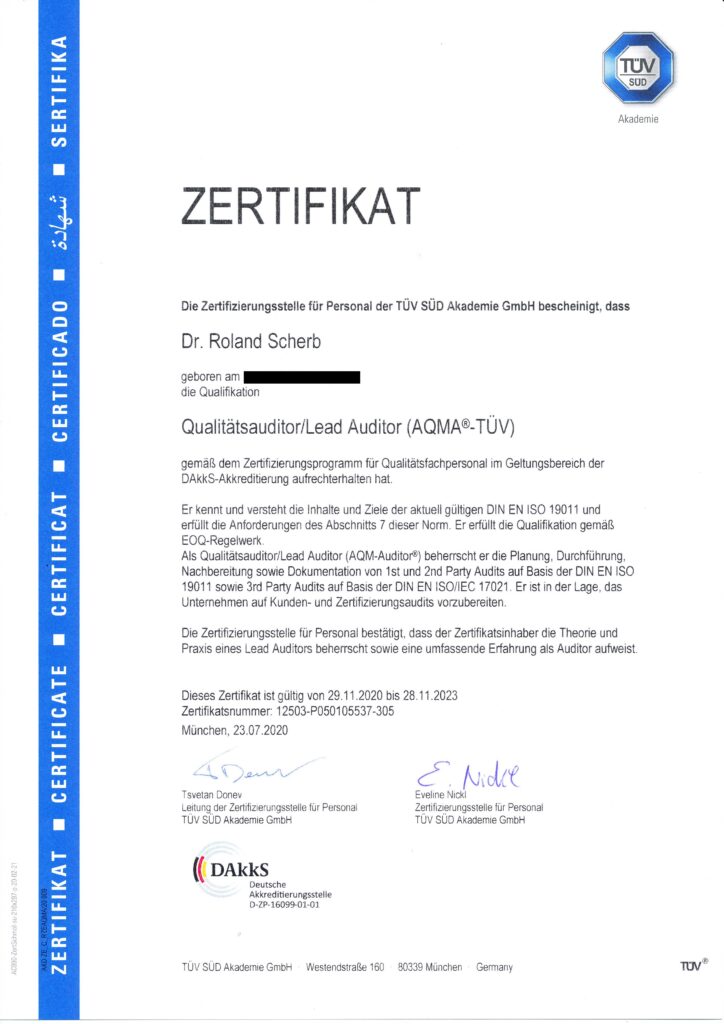Will getting an ISO certification in mechanical engineering be worthwhile for my company?
Mechanical engineering and plant construction are traditionally the great motors of quality management and they also back up the good reputation products “made in Germany” have been having worldwide. But the edge they had has been crumbling tremendously. It’s not just India and China which have become growth champions in mechanical engineering on a global scale. US industries that had already been written off have also started to catch up to a large extent again. German and European companies which want to be successful worldwide are compelled to invest even more in innovation and quality. For as regards productivity and costs, the greatest part of the potential over here has already been tapped.
Nowadays every promise of quality rests on the respective certifications in the mechanical engineering area. In the automotive branch, getting certified has practically already become an absolute requirement for obtaining lucrative orders. But today, the issue of quality management needs to be dealt with in a far broader sense than the way it had originally developed in car manufacturing. Aside from mere product quality, issues of efficiency and company image are focused on nowadays more than ever. A mechanical engineering company without an ISO certification can hardly survive these days.
Advantages of an ISO certification in mechanical engineering
Especially in mechanical engineering, there is hardly any need to discuss such advantages anymore today. Having an ISO certification has simply become pretty much obligatory there. It’s not just the clients who expect that. Subcontractors and suppliers would also have problems if their quality management was up against interfaces that were not suitable (or which didn’t exist in the first place). In practice, such constellations would hardly be surmountable anymore nowadays. Nonetheless, it is always and also important to become regularly aware of the advantages of quality management conforming to ISO. For that is the only way to live and further develop quality management in practice as well.
Competitive opportunities and higher sales figures
Proven quality is an important factor for making it when faced with international competition. It’s not just end clients who trust almost blindly in certifications, evidence and awards. The latter have likewise become important criteria in the B2B area. Aside from prices, opening up new markets and developing new groups of buyers can best be done through actual quality. And today there is nearly always someone who can provide cheaper offers when it comes down to prices.
Cost reduction is still a classic quality management objective, though. Achieving more efficiency and productivity while investing fewer efforts won’t remain an empty promise in case of purposeful and targeted optimization. Especially processes that have been tried and tested for a long time tend to imperceptibly assimilate suboptimal solutions. After a short period of time, “stopgap solutions” have seemingly become inherent parts of actual processes. Basically analyzing such processes again in depth and finding an optimized solution for every sub-process constitutes, therefore, the suitable approach for opening up potential that has not been tapped yet. Thus, costs can be saved in a purposeful and targeted way and the turnover that has already been achieved can be increased further yet.
Company image and risks
These days, fixing a run-down image can take up amounts of money that nearly jeopardize the existence of the very company. Bad press and bad tests are almost inevitably forever ready for retrieval on the internet. Prevention is better than cure and repair here. Then again, having a good image amounts to one half of the marketing efforts required today. During times when buying decisions are more and more often made based on “stars” and “grades”, a couple of positive reports and opinions can be tantamount to securing half of the sales figures.
Nowadays, there is more to quality than it was some years ago. It’s not just about the very product. Soft factors, like environmental protection and sustainability have come to impact purchasing decisions more than ever. So, depending on the specific industry, it can actually make sense to deal with other standards and certifications beyond “normal” ISO 9001 as well.
But risks can already likewise be minimized in advance through quality improvements in connection with an ISO certification. An existing certification as such can often times mitigate general criticism and reproaches (like, for example of gross negligence) by virtue of its very existence. The risk of legal disputes and the costs that would result from litigation can be actively lowered here.
Motivated coworkers and improved productivity
Many companies are scared of the notorious red tape that might go together with quality efforts. However, biases and a bad mood within the company can be prevented ahead of getting an ISO certification by keeping the focus on employee needs from the very start. Of course, introducing quality assurance will result in additional efforts. And naturally, part of such efforts will entail paperwork. But in reality, there will be lots of freedoms and options when it comes down to the actual implementation. In practice, accepting quality management will cause coworkers almost always to become even more willing to perform and to identify more strongly still with product, service and company and to wish to achieve improvements by themselves, too. These points will particularly apply to such highly technical sectors, like mechanical engineering, which have practically always been advanced by ingenious ideas of individual persons.
The integration of new qualified employees can also be facilitated to a great extent through having an ISO certification in place. New coworkers who realize that there are processes which are standardized and therefore, well-known within the company will find it easier to contribute in a productive manner right away without considerable onboarding efforts. So, the need for time-consuming orientations will decrease more and more often.
Your path to successfully obtaining your ISO certification – with PeRoBa Consultancy
PeRoBa GmbH (LLC) in Munich will be happy to support you comprehensively on your way to successfully getting your ISO certification in the mechanical engineering department. We will assist you with analyzing and implementing a suitable quality management system irrespectively of whether you strive for a first certification or whether a new certification is outstanding or whether existing certificates need to be converted. Besides, we will professionally train your coworkers and suppliers and help them get familiar with their work. We will analyze and optimize your processes, organizations and organizational units as well as your existing infrastructure in a purposeful and targeted way. Our consultants will conduct internal audits and provide support in planning future certifications.
PeRoBa consultations – for an ISO certification in the mechanical engineering area!



How may we help you?
If you have any questions dont hesitate contacting us!
You can use our contact form to write us a message, call us or make a free online appointment.



